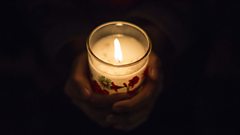Dr Anna Rowlands - 23/06/2018
Thought for the Day
North is the position we set our compass to.
North, as Peter Davidson writes is “the direction taken throughout history by the adventurous, the curious, the solitary, and the foolhardy.”
North, for Stuart Maconie is both ‘something powerful (like Newcastle Brown Ale) and something vague (like most Oasis lyrics)’.
For those of us who live in the North we don’t live with generic ideas of the North, we live rooted in particular places.
In a sense, we each live with our own North – a North made up of collections of past memories, tied irrevocably to particular places, people and times.
And the reality of the North is the people and the places we make our lives with.
The events planned for the Great Exhibition this summer showcase the creativity that has always been part of our Northern story. Yet the Exhibition is taking place in a region – the North East - that now has the lowest wages, highest-use foodbank and largest free school meal entitlement in the country.
Schools tell me that they struggle not only with the impact of low wages and insecure work but also with a chronic lack of self-esteem and a sense of powerlessness amongst families.
It seems to me there is a paradox: people feel simultaneously done-to and yet ignored, peripheral to flows of power and capital and yet trapped by systems that limit and contain their aspiration. Both immense cultural vibrancy and cultural frustration marks ‘the North’ of today.
When St Paul writes about the common good he uses the image of a body made up of its many parts. The common good is often spoken of as if it is a slightly sterile process of consensus building.
For St Paul the common good is closer to an artistic process through which we fashion a social body. Art and innovation, like the wider common good each contributes to, is built on a fragile process through which we venture, fail and venture again.
The common good in this case is neither a true art nor a true politics nor a true Christianity if it frustrates the participation of those who are seen as the least respectable, least honourable and least valuable.
Here’s the uncomfortable edge to Paul’s teaching: ‘the eye cannot say to the hand ‘I have no need of you, nor the hand to the feet’.
The common good can never be reduced to the greatest good for the greatest number, discarding the least.
The challenge is to look at where – and more to the point in whom - you place cultural value, and then look again. Viewed this way, amongst those who are culturally discarded, here is the heartbeat that would enable the social body to thrive.
Duration:
This clip is from
More clips from Thought for the Day
-
![]()
Daniel Greenberg - 14/11/2025
Duration: 02:46
-
![]()
Professor Michael Hurley - 13/11/2025
Duration: 03:05
-
![]()
Rev Roy Jenkins - 12/11/2025
Duration: 03:07
-
![]()
Professor Mona Siddiqui - 11/11/2025
Duration: 02:59






